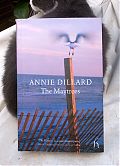
Annie Dillard
The Maytrees
How often do you come across a book like this? Once? Twice if you read it again. The poetics Annie Dillard has mastered are breath taking and then some. Have I mentioned that The Maytrees is beautiful?
It’s her language, her extremely rich and fecund language. If I held this book above my mouth honey would drip out. After each session, when the covers did I shut, the rhythm of Annie Dillard’s words swelled like the sea and the stars and the sand that she has so thoroughly infused her book with. Sometimes I got the piquant feeling of reading nature itself. Like reading the stars Lou and Maytree lay beneath with their son Pete; the tides that threaten their house, the sand dunes of Cape Cod: the sandspit peninsula. Nature plays a part so integral that it is not another character but a substance the characters inhabit—as it inhabits them— a nearest replica to life itself. (But who are we to notice tides and stars and sand?)
The breast of Cygnus was Sadir. Deneb, Altair, and Vega cornered a triangle overhead. The Milky Way smeared through it. The galaxy shed lights from far shores. It seemed to split in two streams that plied side by side over the top, north to south. Meteorites fell, six an ordinary hour. Ursa Major swung on its mooring as if tide loosed it.
The Maytrees is a meticulously constructed novel, well near superb. It is its short, concise size, its perfected sentences, its well-chosen words. Sentences demand to be read again, whether to understand better or just to listen. I believe I can learn a lot about writing from this book; I turned back the pages to the beginning upon finishing. Yes, I must read it again.
[The Maytrees] acted in only two small events—three, if love counts. From ingoing to outgoing tide, this is the story of their inbetween. The Maytrees are a well read couple who live on the “spiraling sandspit” between the ocean and a bay. They are the type that decline work in exchange for days and months of free time. He is a poet and she has been known to paint. Maytree leaves Lou after fourteen years marriage for Deary, who is known for marriages and sleeping on the beach. Twenty years later Deary falls sick. Maytree has no one else to turn to but Lou. Back to Provincetown for those two.
It’s been awhile, reading a character who singularly moves me; I really like Lou Maytree. A female without archetype, she is the silent wise one, calm, even and slightly crazy. A discipline of Diogenes. And in so many ways, her thinking is completely feminine. Her silent calm person blended with nature enough to get the two confused, two perennial influences. Lou prefers no drama: she hardly faltered a blink when Maytree walked out the door. If it was me I would have cried till my eyeballs bled, reading it I almost did. She probably did; his going rips her heart out, but yet she still thinks, so steady, so even: No reason to be surprised. This kind of thing happens all the time.
Their years together were good. He was already gone. All she had to do for peace was to let him go.
It is when Maytree returns with dying Deary that Lou becomes well rounded. Her twenty years without Maytree have, if we believe her, done her good.
She ignored whatever did not interest her. With those blows she opened her days like a piñata. A hundred freedoms fell on her. She hitched free years to her lifespan like a kite tail.
He shows up one cold night at his dune shack ceded to Lou. “Well, come in,” she says as if he was always out there in the dark strolling down the shore. As if mending a run away husband and tending to his run away dying mistress was the most natural thing in the world. Lou’s love is always right there.
It is Maytree who asks love’s questions in red-speckled notebooks and then black. What is the point of love’s eighteen months of passion, its surprising reoccurrence, did he stop loving Lou once he took off with Deary? Their contrast: Maytree’s questioning and Lou’s simple, “Why wouldn’t I help them?” Maytree and Deary were her old friends. Lou never mentions love’s name nor the wrong Maytree did, his source of shame. And I can’t help thinking, of course she’s right.
…did he think so poorly of her, and so well of himself, that he fancied his chucking her and Pete for Deary had left her ruined and angry for twenty years? Surely he know her better than that. Surely!—or else he really would insult her.
“If love counts.” How does it not? That’s all this book is about. The most tranquil love story every written. Love like the tides, like the dunes, like the stars, stories told to go on. Annie Dillard stuns in this magical book. A book to remind why books are written. The Maytrees is beautiful.
· · · · · · · · · · · · · · · · · · · ·